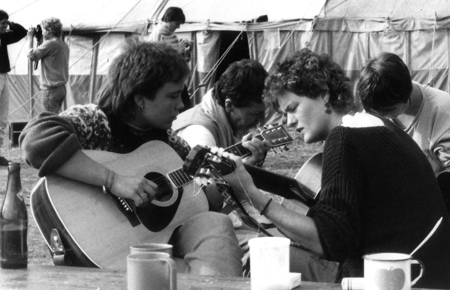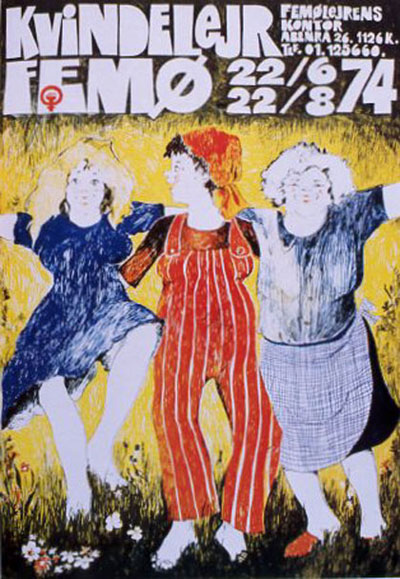The Femø Women’s Camp has been held since 1971. Until the mid-1980s it was arranged
by the Women’s Liberation Movement that organised the camp, and it was based on the
movement’s ideals of sisterly solidarity and feminist culture.
Since there was no longer a unified Women’s Liberation Movement from the mid-1980s, the
camp continued as an independent association.
Posters
Se all the Posters made to invite to the Womenscamp or Femøcamp
In later years we only designed flyers and in some years we made beautiful leaflets.
Now we mostly inform people about the camp by internet and social media.

The 1980s marked a phase of departure, when many of the fundamental principles of the
camp were challenged. The number of participants fell and gradually it was primarily
lesbians who came.
Since the 1990s many of those taking part have looked upon the camp as a lesbian oasis,
and they come to have a fun holiday in an environment where homosexuality is the norm.
However, some women still come in order to discuss feminism.
Today the camp is described as having a multifarious character, because there is room for
all kinds of women, each of whom comes for their own individual reasons. In 2023, the
Women’s Camp decided that participation in the camp would be open for all women and
non-binary folks with an F or X in the passport could participate. The participants agree that
one of the most important reasons for going to the Femø Women’s Camp is because of the
feelings of solidarity experienced there – just like the time when the camp was considered to
be a part of the Women’s Liberation Movement.
The decisive point of reference for the camp in women’s history is made clear by its current
function as a place of memories for the collective reminiscences of the 1970s’ new feminist
movement.
Shared memories about the camp are maintained by the practice of the participants
reminiscing about the camp, which amongst other things comes to expression in
anecdotes and songs.
(Anne Brædder: The Femø Women’s Camp 1971-2010 and the collective recollections of
the camp by the ‘femønists’ (participants).)
Published in Arbejderhistorie 3/2010, pp. 70-86.
Womens movements history in Emma
Danish reference to the Flying Lesbians
Poster 1974
